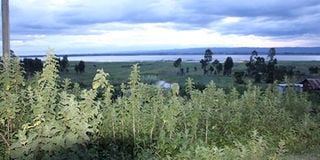Encroachers frustrate bid to save central's Lake Olbolosatt

A view of Lake Ol Bolossat with houses built close to the water body. Continued encroachment on lake’s riparian land has frustrated every effort by the county and national governments to rehabilitate its lost glory and convert it to a key tourist attraction. PHOTO | WAIKWA MAINA | NATION MEDIA GROUP
What you need to know:
- Rehabilitation is yet to commence, nearly two years after the gazettement of the lake as a wetland protected area.
- Shamata MCA Gitau Njamba says the allocations in the 1990s paved way for more grabbing and encroachment.
- After the gazettement, the National Land Commission chairman nullified the tittle deeds.
Continued encroachment on Lake Olbolosatt’s riparian land has frustrated every effort by the county and national governments to rehabilitate its lost glory and convert it to a key tourist attraction.
Rehabilitation is yet to commence, nearly two years after the gazettement of the lake as a wetland protected area.
The gazettement as meant to clear the way towards reclaiming encroached land, rehabilitation and development to a lucrative tourism site.
LAND GRABBERS
Mr Moses Mwangi, a resident neighbouring the lake, says the death of the lake started in 1992 when influential people in the government were allocated tens of acres of land from Ol Joro Orok, where the lake starts, to Manguo village in Nyahururu township, Laikipia County.
The beneficiaries then sold the parcels to smallholders, which has complicated the land recovery efforts by the government.
Shamata MCA Gitau Njamba says the allocations in the 1990s paved way for more grabbing and encroachment, which is still happening.
“We have those allocated the riparian land during the Kanu regime under the Olbolosatt settlement scheme, and we have those who arrived later. Very influential people continue to illegally acquire the riparian land making reclaiming a complex issue,” said Mr Njamba.
MARK BOUNDARY
He added that the Ministry of Land and the county government should do a survey, clearly mark the boundaries and reclaim what has been grabbed.
“The lake might be no more in a few years. They are not only grabbing the riparian land but Shamata hills that are a source of water for the lake,” said the MCA.
Mr Njamba says that residents who acquired land under the settlement scheme should be given title deeds or proper resettlement plans with compensation done.
But a resident, Mr Josphat Mwaura differs with the MCA, saying the illegal allocation should be revoked, noting the damage it is causing to the lake.
NO WILDLIFE
“I was born and brought up here. I have watched the beauty of the lake disappear with time. The wildlife and birds that attracted tourists have vanished. The morning dew that covered the lake catchment area extending to the Aberdare Forest is no more,” says Mr Mwaura.
Mr Mwangi, whose land borders Lake Olbolosatt, says the farmers who have encroached on the lake are ready to vacate the riparian land, but with adequate compensation.
TITLE DEEDS
After the gazettement, former National Land Commission chairman Mohammad Swazuri nullified the tittle deeds during the 2018World Wetlands Day.
Dr Swazuri said the gazette notice recognised the lake and riparian land as a wetland, important habitat, and ecosystem for wildlife conservation.
Lake Olbolosatt, the only lake freshwater lake in central Kenya, is the source of water for Ewaso Nyiro River, which serves communities, wildlife, and livestock in the dry Laikipia, Samburu, Isiolo, and Garissa counties.
Ms Mercy Wanjiku, a resident, says the situation at the lake has worsened, with water levels diminishing due to destruction of the forest cover at the Shamata hills where streams feeding the lake originate from.

Shamata hills where streams feeding Lake Olbolosatt originate from. The cutting down of trees on the hills has made the streams to dry up. PHOTO | WAIKWA MAINA | NATION MEDIA GROUP
STREAMS DRY
“Most of the streams have dried up. The evergreen Shamata hills are no more. People have settled there and there is massive cutting down of the trees,” said Ms Wanjiku.
Among the projected developments by the county government after the gazettement but which cannot take place due to the encroachment include the planting of bamboo trees on the riparian lands and the Shamata hills.
“Our main focus under the environmental rehabilitation programme covering the lake and the Aberdare Forest is bamboo and glory cider, which will pave way for the creation of wood and animal feeds industries. These trees are very good in soil-enriching, furniture, and briquettes,” said Nyandarua Governor Francis Kimemia.




